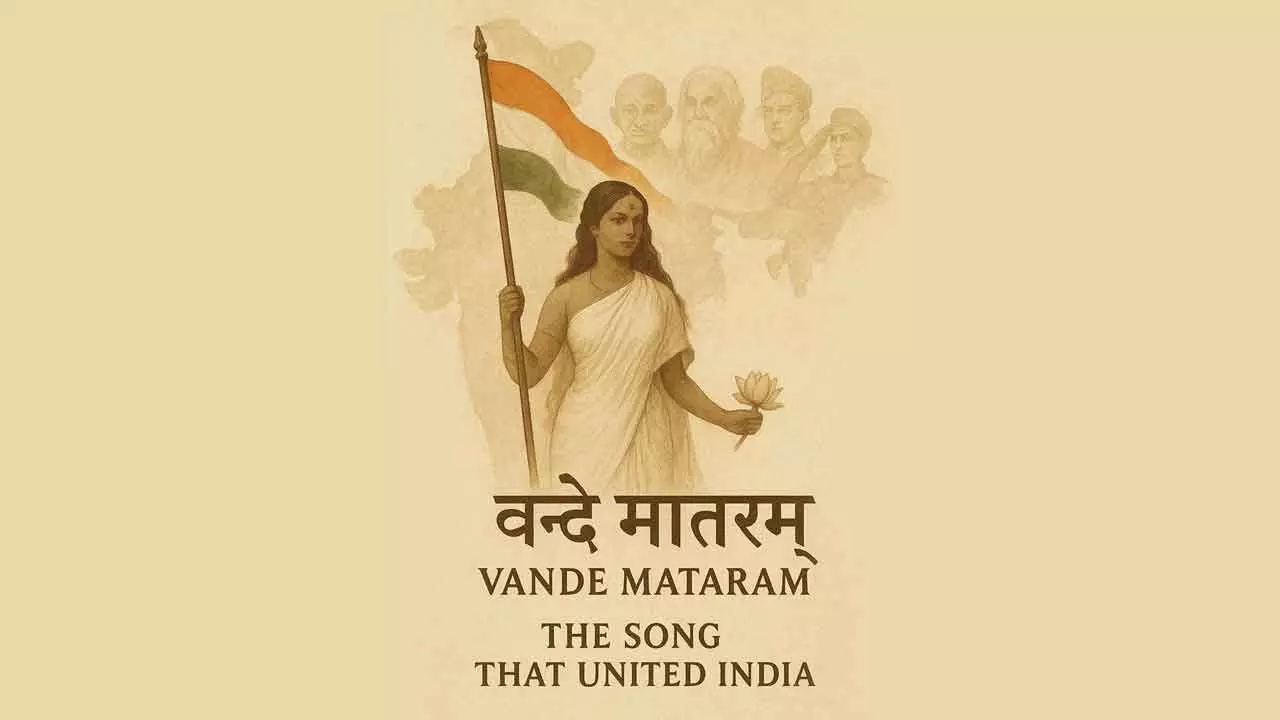Vande Mataram@150 needs no defence; Only the opposition needs a conscience
Congress once sang it for freedom, now silences it for votes
Vande Mataram@150 needs no defence; Only the opposition needs a conscience

Vande Mataram — a song that once united 140 crore Indians in spirit — was the rallying cry of freedom fighters and echoed through protests, meetings, and Congress gatherings during the Independence movement. It symbolised courage and unity, connecting every Indian heart that yearned for freedom. Having weathered many storms in the past, the song now faces a new one — from pseudo-secular leaders driven by power and divisive politics, seeking to communalise it.
These self-styled secularists include leaders including Rahul Gandhi and Tejaswi Yadav who did not bling to put up candidates like Osama, son of Shahabuddin (the infamous Don), from Siwan constituency in Bihar cannot muster the courage to say that every Indian irrespective of his caste and religion should feel proud to sing national anthem and national song.
They have no guts even to argue that Vande Mataramdoes not equate the nation with specific — a baseless claim born of political opportunism, not genuine belief.
This distortion insults the great poet Bankim Chandra Chatterjee, who composed the song, and Rabindranath Tagore, who first sang it at the 1896 session of the Indian National Congress, marking its deep association with India’s freedom movement. To question the song is to brand these towering figures as communal — an affront to India’s cultural and intellectual heritage.
Yet, the jaundiced-eyed opposition parties lack the spine to tell their allies to change their outlook before joining hands to fight elections. We cannot allow anyone to belittle Bankim Chandra Chatterjee, the composer of Vande Mataram, or Rabindranath Tagore, the poet, philosopher, artist, and social reformer who sang the national song and penned the national anthem.
The Congress of today is not the Indian National Congress of the freedom struggle. Neither its current leaders nor its allies like AIMIM or the Samajwadi Party — who openly refuse to sing Vande Mataram — understand the real meaning of each word of the song. The title itself, Vande Mataram, means “I praise thee, Mother”, symbolising devotion to the motherland.
The Congress party which claims that it was only they who got independence for the country developed cold feet way back in 1937 when the Congress Working Committee officially adopted the first two verses of the poem as India’s National Song.
On January 24, 1950, Dr. Rajendra Prasad, the first President of India, declared in the Constituent Assembly that Vande Mataram should be honoured equally with Jana Gana Mana. But Congress which did not honour Mahatma Gandhi’s advice to wind up the party after Independence did not give any credence to what the first President of India said.
Sadly, Congress’s obsession with minority appeasement pushed patriotism to the background. Some leaders branded parts of the song as “religious”, ignoring that the verses were devotional — not sectarian. What once united Indians under colonial rule is now caught in political crossfire. Its revolutionary spirit has been overshadowed by misinterpretation and misuse.
Over the years, musicians from A.R. Rahman to Lata Mangeshkar have given Vande Mataram new voice and vitality. The song transcends language and faith, reminding every Indian that patriotism is not inherited — it is felt. Its endurance lies in its emotion. The opening lines — “Shubhra jyotsnapulakitayāminīm, phullakusumitadrumadalaśobhinīm” — paint India not as an abstraction but as a living mother, radiant in moonlight and fragrant with flowers. It evokes gratitude, not compulsion; belonging, not boundary.
The Soldier’s Song
What’s remarkable is how Vande Mataram continues to inspire those who embody service to the motherland — India’s armed forces. While not an official regimental song, it holds deep ceremonial and emotional significance. During Independence Day and Republic Day parades, or at solemn military functions, the Indian Army bands often play Vande Mataram. Troops stand at attention, saluting the motherland.
For soldiers whose only religion is the defence of the nation, the song transcends politics. It is about the bond between a soldier and the soil he protects. The Indian Army — proudly plural with Hindus, Muslims, Sikhs, Christians, and others — embodies the unity Vande Mataram celebrates. Yet such sentiments seem lost on opposition leaders like Rahul Gandhi, who remain unmoved by its spirit.
Reclaiming the Song’s Spirit
As India marks 150 years of Vande Mataram, we must ask: what does it mean today? For generations born long after Independence, it may not carry the immediacy of rebellion, but it remains a moral compass. It urges us to honour our land — its rivers, fields, languages, and people — and to see service to the nation as sacred. It calls for gratitude, not aggression; unity, not uniformity.
The song’s journey mirrors that of India itself — from colonisation to freedom, from idealism to division, from rediscovery to renewal. More than a century after it first stirred hearts in Calcutta, Vande Mataram continues to echo across classrooms, stadiums, and parade grounds.
Its strength lies in its simplicity: “I bow to thee, Mother.” At its core, it is not a slogan but a sentiment — a rhythm of India’s continuing story: proud, plural, and ever-renewing. ‘Jago Bharat Jago’
(The author is former Chief Editor at The Hans India)

